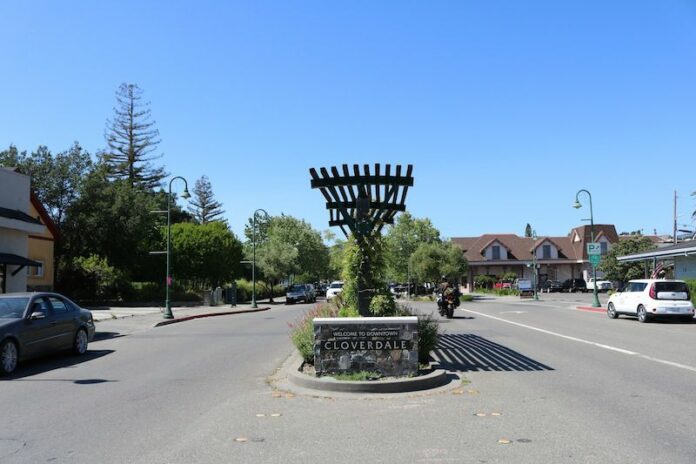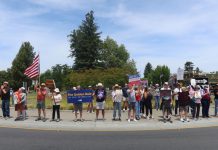Resilience is a word commonly used to describe the Latinx community. But psychologists offering complimentary mental health services in Cloverdale say pushing through trauma should not be normalized.
On The Margins founder Daniela Dominguez, a licensed psychologist, is partnering with Cloverdale nonprofit La Familia Sana to offer mental health therapy to individuals and couples in the area who need it. The services are open to all Cloverdale, Geyserville and Healdsburg residents. On The Margins offers consulting, coaching, counseling and therapy, among other services which provide transformative justice and healing justice types of interventions and programs.
Dominguez said it is often heard that Spanish speaking communities don’t necessarily use mental health services, but in Cloverdale, people are calling.
Isaac Velazquez, 53, who has been a Cloverdale resident for 10 years went to therapy for the first time using this program.
Velazquez said what motivated him to go was a suggestion made to him while working on his wife’s immigrant status.
“I have been going for almost three months. It’s great, the questions and the way they do the interview and converse with me helps me a lot in gaining trust and being able to talk about my life and how I grew up,” Velazquez said in Spanish.
For him, therapy services and going to them are extremely necessary.
“There are many things one has to talk about and sometimes you don’t know you need to talk about them and when you are with someone who knows how to speak and ask questions, it helps a lot,” he said.
Velazquez plans to go two or three more times. He went in order to check his mental state but did not have any negative issues.
“I don’t have childhood problems or depression, but it helped me learn if I have it or not and in reality I do not,” Velazquez said.
Even though he was asked to do it to help his wife, Velazquez believes he would have gone by himself.
“Because as you grow up you need to speak with others about private matters. I think it is 100% necessary for the Cloverdale community. It helped me learn about my childhood, to let out stuff that sometimes you do not know they exist and they do exist. Latinx people and Mexicans in particular have a huge problem with not opening up, not letting go and talking. I think with someone professional and someone they do not know, they might do it,” he said about the mental health stigma in Latinx communities.
Velazquez considers there are definitely more mental problems now due to COVID-19.
“There is more depression, more insecurities, more necessity to know if they are doing right or wrong. They need to learn to be more positive and have more desires to pull through,” he said.
“That is what therapy does, it helps you remember about what you suffered, maybe what is hidden in your mind and you let it out. Maybe you had self-esteem problems or support and here there are people who can help us be better people ourselves,” Velazquez said.
For him, being able to receive these services for free is fascinating but he wishes they would be advertised more.
“I think there should be more of this kind of help by the county. I know there are people who pay for therapy but I think these programs should let themselves be more known. A lot of people do not know they exist and that there is a possibility for them to attend and I think that is the main problem,” he said.
“Maybe mental health services can have a small house or a tent and you talk with someone for 10 or five minutes and people then ask about where offices are or want to talk in private. By making the program known I think people would open up more and look for the services,”
Dominguez said so far, the clinical work done in Cloverdale has been a great experience,
“I’ve just been so inspired and I really mean it from the bottom of my heart by the work that the Familia Sana is doing with the community in Cloverdale. They are really rolling up their sleeves to try to support communities there,” she said.
Dominguez said when looking for partnerships, On The Margins looks into being able to collaborate long term.
“That’s something that I had a conversation with La Familia Sana about and they are fully on board with making sure that if we are partnering that this is going to be something that we will be doing long term and it’s been, it’s been wonderful,” she said,
Dominguez is the psychologist going to Cloverdale once a week but the program is also providing telehealth.
“That’s another therapist and her name is Erika. We use a platform called simple practice. We make sure to send the community members a link where they can meet with their therapist, and that has been really convenient for folks who are less, you know, working long hours. So we’re able to accommodate them. It’s a team of three, one person offers administrative support, and the two of us are providing therapy,” she said.
“We’ve committed to being up there in Cloverdale for 47 weeks and our hope is, like we said, that’s kind of long term,” Dominguez said.
The program is actively looking for funding in order to provide services beyond the 47 weeks, and to offer therapy in person more than once a week.
“I really do want to advocate on the behalf of the community in Cloverdale. When we talk to them, they tell us that they’ve been looking for counseling, they’ve been on waitlist or that people are not returning their calls wherever it is that they’re searching for counseling, or that they cannot find a bilingual bicultural counselor,” she said.
For Dominguez, the shortage of bilingual bicultural counselors in the county is a real setback.
At the moment the grant is meant to serve 60 to 80 clients. In their second month, the program has gotten close to 60.
“So that just kind of shows you that there’s definitely a need, and that we need more support. I see a resilient community here and I know that we constantly talk about how resilient the next community is. But, I also think that there’s a risk to romanticizing resilience and constantly seeing, you know, the communities resilient,” Dominguez said about her patients.
“I see the community experiencing multiple adversities, such as farmers. The clients that I am currently trying to work with are working long hours, by the time that they come to counseling, many of them are exhausted, they’re requesting sessions late in the afternoon, because they’re getting out of work. They’ve experienced financial hardship, concerns around housing, concerns around employment, documentation status, families being impacted by family separation as a result of immigration concerns. Concerns around racial injustice, traumatic stress, people talking about segregation in the area. My concern is that if we don’t address these concerns, at this time, that the negative impact is going to be even more detrimental,” she said.
Dominguez added there is more to do but bringing more bilingual, bicultural, Spanish speaking clinicians to the Cloverdale area and to northern Sonoma County comes first. Not only are her patients from Cloverdale, but she has received requests from people in different parts of northern Sonoma County. Dominguez emphasized it is more than a response to a mental health crisis, it is a long-term service that should be offered for multiple traumas.
“I really feel like oftentimes we are figuring out ways to just kind of respond to crises. That’s not going to work when it comes to mental health. It’s not sufficient. It will help some, but we’re seeing that these communities are again struggling with multiple things. I think that there need to be significant investments in the Latinx community in Sonoma County but specifically, I would say the Cloverdale area. I think this is just the call for people in positions of power to support La Familia Sana,” Dominguez said.









